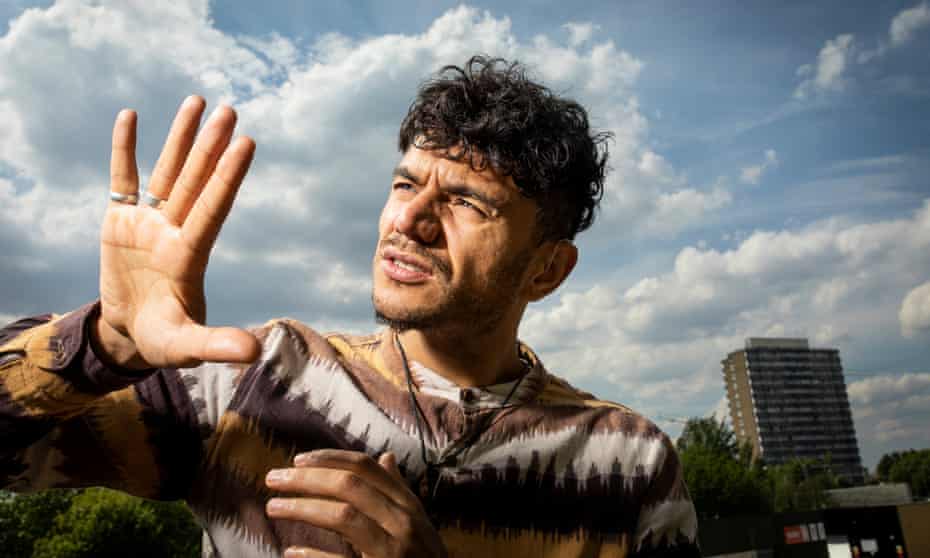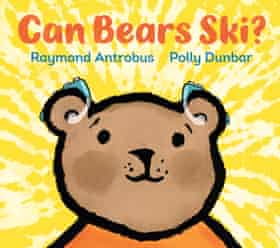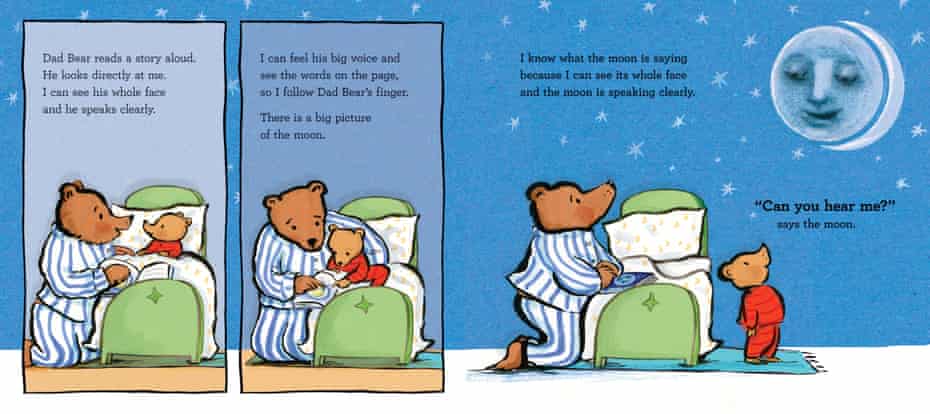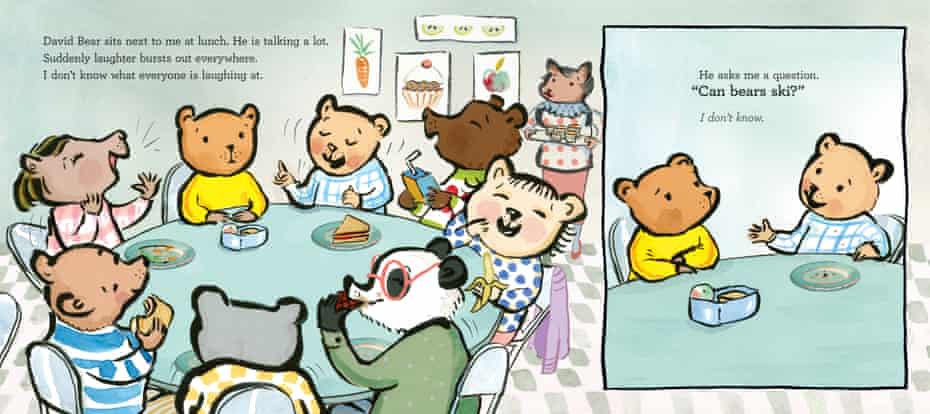Interview
Raymond Antrobus: 'Deafness is an experience, not a trauma'
Sian Cain

‘It’s ridiculous to me that there weren’t more kids’ books with deaf protagonists’
... Raymond Antrobus. Photograph: David Levene/the Guardian
The award-winning poet has written his first picture book, Can Bears Ski?, after being unable to find any children’s titles with a deaf protagonist
@siancain
Tue 23 Mar 2021
There’s a story that Raymond Antrobus often tells, from the time before his deafness was diagnosed when he was six: when his father read him a picture book, Antrobus would nestle into his father’s chest, and feel the story he could not hear through the vibrations of his body. The book was often his favourite, Happy Birthday Moon; both the memory and the book would, decades later, give him the name of a poem in his prize-winning debut The Perseverance. “I’d like to be the Moon, the bear, even the rain. / Dad makes the Moon say something new every night / and we hear each other, really hear each other. / As Dad reads aloud, I follow his finger across the page.”
The award-winning poet has written his first picture book, Can Bears Ski?, after being unable to find any children’s titles with a deaf protagonist
@siancain
Tue 23 Mar 2021
There’s a story that Raymond Antrobus often tells, from the time before his deafness was diagnosed when he was six: when his father read him a picture book, Antrobus would nestle into his father’s chest, and feel the story he could not hear through the vibrations of his body. The book was often his favourite, Happy Birthday Moon; both the memory and the book would, decades later, give him the name of a poem in his prize-winning debut The Perseverance. “I’d like to be the Moon, the bear, even the rain. / Dad makes the Moon say something new every night / and we hear each other, really hear each other. / As Dad reads aloud, I follow his finger across the page.”

Now the memory has also inspired his first picture book, Can Bears Ski? Antrobus finally became the bear: the book follows his cuddly little protagonist, who hears the book’s title when adults ask, “Can you hear me?”, until his deafness is finally recognised.
Antrobus, 34, originally declined to write a children’s book when he caught the eye of publishers while reading Happy Birthday Moon at a literary festival. “I told this story all the time but I never thought of it as a kids’ book. The thing is, I still very much see myself as a poet,” he says. “Poetry is the thing I live for. But I’ve realised that a lot of my worry has been ego. A lot of poets I love also write for children. I think it’s just snobbery. In the poetry world, if I am honest, there’s just so much mean-spirited snobbery. And maybe I’ve just been in it for too long and that’s why I didn’t want to write a kids’ book. But I feel fine about this book now. I am so, so proud of it.”

Can Bears Ski? by Raymond Antrobus, illustrations by Polly Dunbar.
Photograph: Polly Dunbar
A while after the festival, standing in the library at Blanche Nevile, the deaf school in London that Antrobus once attended and where he now teaches, he checked the shelves. “There were no books for young children that had a deaf central character. There was nothing. So I decided I would give it a go.”
Antrobus then met children’s author Joyce Dunbar, who is profoundly deaf, at a literature festival. “Joyce was so supportive. I was worried that I would be stepping into a lane that’s not my own. Getting approval from a veteran was a blessing for me – if you think this is OK, no one can really tell me anything now.” By chance, the illustrator assigned to Can Bears Ski? was Polly Dunbar, Joyce’s daughter. When Antrobus saw her illustrations, he cried: “I just had to step outside the office, I couldn’t quite believe how well she nailed it.”
Antrobus has been getting messages from all over the world about Can Bears Ski?: from grandparents who use the book to explain their deafness to their grandchildren; a boy who wrote that he would ask his friend about his hearing aids for the first time; a whole school in Canada that was so inspired, they organised a skiing trip. “And none of them have been, ‘Oh, the poor deaf bear!’” he says. “Deafness is an experience, not a trauma. A diagnosis is not a tragic story, but managing it is a very real concern. I have hearing parents and they didn’t know whaonists. It is a symptom of a mainstream culture that is failing everyone. So my book t to do. It’s ridiculous to me that there weren’t more kids’ books with deaf protagis having a life beyond what I could have dreamed of, and that is really exciting.”
Antrobus is in an Oklahoma hotel room when we speak, waiting out a huge snowstorm that has taken out the heating in his home. His wife is American and Antrobus is currently living in the US with her, as they have both been caught up in immigration delays amid the pandemic. To further complicate matters, they are now expecting their first child: “We’ve been seeing midwives and looking at how much a birth costs in the US compared to the UK where it is free,” he huffs. “I am just being hit with constant new things.”
One positive new thing snuck in just weeks before the pandemic: after giving a talk to a roomful of audiologists, Antrobus was swamped by offers to improve his hearing aids. I’ve met Antrobus before and seen his previous hearing aids from the NHS; the devices in his ears now are entirely invisible on Zoom. He says they have changed his life, that he can hear sound through walls for the first time.
A while after the festival, standing in the library at Blanche Nevile, the deaf school in London that Antrobus once attended and where he now teaches, he checked the shelves. “There were no books for young children that had a deaf central character. There was nothing. So I decided I would give it a go.”
Antrobus then met children’s author Joyce Dunbar, who is profoundly deaf, at a literature festival. “Joyce was so supportive. I was worried that I would be stepping into a lane that’s not my own. Getting approval from a veteran was a blessing for me – if you think this is OK, no one can really tell me anything now.” By chance, the illustrator assigned to Can Bears Ski? was Polly Dunbar, Joyce’s daughter. When Antrobus saw her illustrations, he cried: “I just had to step outside the office, I couldn’t quite believe how well she nailed it.”
Antrobus has been getting messages from all over the world about Can Bears Ski?: from grandparents who use the book to explain their deafness to their grandchildren; a boy who wrote that he would ask his friend about his hearing aids for the first time; a whole school in Canada that was so inspired, they organised a skiing trip. “And none of them have been, ‘Oh, the poor deaf bear!’” he says. “Deafness is an experience, not a trauma. A diagnosis is not a tragic story, but managing it is a very real concern. I have hearing parents and they didn’t know whaonists. It is a symptom of a mainstream culture that is failing everyone. So my book t to do. It’s ridiculous to me that there weren’t more kids’ books with deaf protagis having a life beyond what I could have dreamed of, and that is really exciting.”
Antrobus is in an Oklahoma hotel room when we speak, waiting out a huge snowstorm that has taken out the heating in his home. His wife is American and Antrobus is currently living in the US with her, as they have both been caught up in immigration delays amid the pandemic. To further complicate matters, they are now expecting their first child: “We’ve been seeing midwives and looking at how much a birth costs in the US compared to the UK where it is free,” he huffs. “I am just being hit with constant new things.”
One positive new thing snuck in just weeks before the pandemic: after giving a talk to a roomful of audiologists, Antrobus was swamped by offers to improve his hearing aids. I’ve met Antrobus before and seen his previous hearing aids from the NHS; the devices in his ears now are entirely invisible on Zoom. He says they have changed his life, that he can hear sound through walls for the first time.

Can Bears Ski? by Raymond Antrobus, illustrations by Polly Dunbar.
Photograph: Polly Dunbar
“They are like the most powerful hearing aids that exist and they have been a godsend. I have been living in a whole new world of sound in the pandemic. I have been on NHS hearing aids my whole life – these are worth thousands and I wouldn’t have access to these otherwise. The kids I work with, they don’t have access to this. But my god, has it made a difference.”
Like everyone in lockdown, he has watched a lot of TV, but for a very different reason: armed with his flash tech, he is now watching all the films he remembers seeing without captions as a child. “All my ideas of my favourite childhood films are wrong!” he says. “This whole thing has opened up to me, I’ve had different stories for all of them.” In lockdown, he’s also made a BBC Radio 4 show, Inventions in Sound – a programme about captioning.
While Can Bears Ski? began with a memory of his father, the role the bear’s father plays in the book – finding lost hearing aids, juggling appointments – was all his mother. “I could never really talk to my dad about my experiences, that world was completely alien to him,” Antrobus says. “He didn’t participate. I don’t want to make excuses for him. But I did want this book to challenge gender roles. Before it came out, I had to tell mum, ‘I am not giving dad the credit here, I am just providing a model.’ He just wasn’t present. He didn’t have any language, he never even called me deaf, he’d just call me ‘limited’. That was always his word and the way he used it, it did affect me. We would call that ableist language now. So in a way, the book models the childhood I wish I had with my dad. But I hope it also honours what my mum did.” He’s promised that his next poetry collection, out in September, is “all about her”. “And she’s come around now,” he laughs.
Can Bears Ski? is published by Walker Books. Inventions in Sound is next broadcast on BBC Radio 4 on 31 March.
“They are like the most powerful hearing aids that exist and they have been a godsend. I have been living in a whole new world of sound in the pandemic. I have been on NHS hearing aids my whole life – these are worth thousands and I wouldn’t have access to these otherwise. The kids I work with, they don’t have access to this. But my god, has it made a difference.”
Like everyone in lockdown, he has watched a lot of TV, but for a very different reason: armed with his flash tech, he is now watching all the films he remembers seeing without captions as a child. “All my ideas of my favourite childhood films are wrong!” he says. “This whole thing has opened up to me, I’ve had different stories for all of them.” In lockdown, he’s also made a BBC Radio 4 show, Inventions in Sound – a programme about captioning.
While Can Bears Ski? began with a memory of his father, the role the bear’s father plays in the book – finding lost hearing aids, juggling appointments – was all his mother. “I could never really talk to my dad about my experiences, that world was completely alien to him,” Antrobus says. “He didn’t participate. I don’t want to make excuses for him. But I did want this book to challenge gender roles. Before it came out, I had to tell mum, ‘I am not giving dad the credit here, I am just providing a model.’ He just wasn’t present. He didn’t have any language, he never even called me deaf, he’d just call me ‘limited’. That was always his word and the way he used it, it did affect me. We would call that ableist language now. So in a way, the book models the childhood I wish I had with my dad. But I hope it also honours what my mum did.” He’s promised that his next poetry collection, out in September, is “all about her”. “And she’s come around now,” he laughs.
Can Bears Ski? is published by Walker Books. Inventions in Sound is next broadcast on BBC Radio 4 on 31 March.
No comments:
Post a Comment